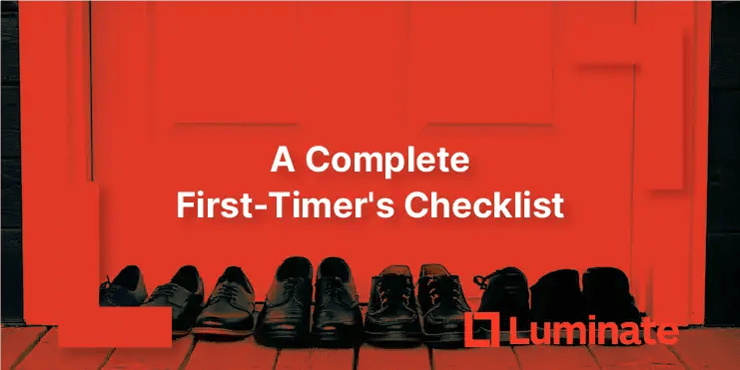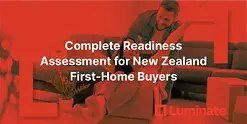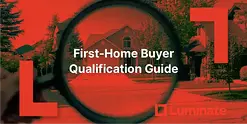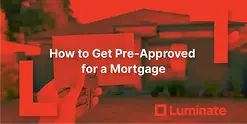Open Homes Checklist for First-Time NZ Property Buyers
 By
Trent Bradley
·
14 minute read
By
Trent Bradley
·
14 minute read

Walking through your first open home is an exciting step in your journey to buying a property. You're finally off the internet and into real spaces where you can imagine your future. But as a first-home buyer, it's easy to get swept up in the excitement and forget to look beyond the surface.
Table of Content
- Why a Proper Open Home Inspection Matters
- Be Prepared Before You Arrive
- What to Bring to an Open Home
- Outside the Property: Exterior Inspection Checklist
- Inside the Home: Interior Inspection Checklist
- Layout and Liveability Assessment
- Questions to Ask the Real Estate Agent
- After the Open Home: What to Do Next
- Red Flags That Should Stop You Making an Offer
- How Luminate Financial Group Supports First-Home Buyers
- Frequently Asked Questions About Open Homes in New Zealand
- Take the Next Step in Your Property Journey
Key Takeaways
- Spend 20-30 minutes at each open home systematically inspecting exterior and interior—don't rush through or let emotional excitement override careful assessment
- Get mortgage pre-approval before attending open homes so you know your exact budget and can act quickly when you find the right property
- Bring essential items: phone for photos/notes, tape measure, inspection checklist, and ideally a trusted second person to spot things you might miss
- Always inspect the exterior first for 5-10 minutes checking roof, cladding, foundations, and drainage before entering—exterior issues often indicate bigger problems inside
- Look beyond staging and fresh paint for red flags: water stains on ceilings, cracks in walls, musty smells, soft floors, poor ventilation, and old electrical/plumbing systems
- Ask the agent direct questions about time on market, building consents, property reports, roof age, and any renovations—get answers in writing when possible
- Properties built 1992-2004 with monolithic cladding are high-risk for weathertightness issues and always require professional building reports before making offers
- Document everything immediately after leaving with photos and notes before visiting other properties, as details blur quickly when viewing multiple homes
At Luminate Financial Group, we work with first-time buyers every day and one of the most common mistakes we see is people falling in love with a property without knowing what to check. Open homes often last less than 30 minutes and real estate agents are trained to highlight the positives, not the problems.
This comprehensive guide gives you a practical, New Zealand-specific checklist to follow at every open home. It's designed to help you stay focused, assess the right things, and avoid costly surprises later on.
Why a Proper Open Home Inspection Matters
For most first-home buyers, a property purchase represents the largest financial commitment of their lives. A beautiful staging job or fresh coat of paint can mask serious structural issues, weathertightness problems, or maintenance backlogs that could cost tens of thousands of dollars to fix.
The Cost of Missing Red Flags
Common issues that buyers miss at open homes include:
- Moisture and mould problems: Can cost $5,000-$30,000+ to remediate
- Roof repairs or replacement: Typically $10,000-$40,000 depending on size and material
- Foundation or structural issues: Can exceed $50,000 in severe cases
- Weathertightness and cladding problems: Often $30,000-$100,000+ to repair
- Electrical or plumbing upgrades: $5,000-$20,000 for full rewiring or replumbing
A systematic inspection approach can help you identify these issues early, allowing you to either negotiate on price, request repairs, or walk away before you're committed.
Be Prepared Before You Arrive
Before attending any open home, make sure you know your budget and lending position. Being pre-approved gives you confidence to act quickly if the right property comes up and helps you avoid wasting time on places that aren't within reach.
Get Your Finances Sorted First
Pre-approval benefits:
- Know your exact borrowing capacity
- Understand deposit requirements for specific price ranges
- Identify which properties are realistic options
- Move quickly when you find the right home
- Negotiate with confidence as a serious buyer
At Luminate, we help first-home buyers secure pre-approval before they start viewing properties. This means you're shopping with certainty rather than hope.
Research the Area and Property
It's also helpful to research before you go. The more informed you are, the more targeted your questions will be once you're inside.
Essential research to complete:
| Research Area | What to Check | Where to Find It |
|---|---|---|
| Recent sales | Comparable properties sold in last 6 months | homes.co.nz, realestate.co.nz, Homes.co.nz |
| Property history | Previous sale prices and dates | Property Guru, Homes.co.nz |
| Council information | Zoning, consents, notices | LIM report or council website |
| School zones | Primary and secondary school catchments | School zone checker, Education.govt.nz |
| Flood risk | Natural hazards and flood zones | Council GIS mapping, LAWA website |
| Commute times | Travel time to work at peak hours | Google Maps (check different times) |
Understanding the local market also helps you recognize whether a property is realistically priced or overvalued.
What to Bring to an Open Home
Keep it simple. You don't need to arrive with clipboards and spreadsheets, but having a few essentials makes a big difference.
Your Open Home Kit
Essential items:
- Your phone (for photos, notes, and measurements)
- Small notepad and pen (backup for note-taking)
- This checklist (printed or saved on your phone)
- Tape measure (if you're serious about furniture fit)
- Photos of your furniture (or key measurements)
Optional but helpful:
- Torch or phone flashlight (for dark spaces like garages or subfloors)
- Moisture meter (for serious buyers, available for $20-50)
- Building report from a previous inspection (if you're doing a second viewing)
Bring a Second Set of Eyes
Many first-home buyers find it helpful to bring a trusted friend or family member. A second person often spots things you may miss, especially when you're emotionally invested in a property.
Ideal companions:
- Someone with building, renovation, or property experience
- A friend or family member who can stay objective
- Your partner (if buying together) to ensure you both assess the same features
Avoid bringing large groups, as this can be overwhelming and may prevent you from having candid conversations with the agent.
Outside the Property: Exterior Inspection Checklist
Before you even step through the front door, take 5-10 minutes to assess the exterior. This can give you early signs of potential issues or confirm the property is well maintained.
Roof and Gutters
What to check:
- Overall condition and age of roofing material
- Signs of rust, moss, lichen, or sagging
- Missing, broken, or lifting tiles or corrugated iron
- Gutters: Are they clean, secure, and free-flowing?
- Downpipes: Are they connected and directing water away from foundations?
Red flags:
- Visible rust holes or deteriorating roofing material
- Sagging rooflines (suggests structural issues)
- Heavy moss growth (indicates poor maintenance or moisture retention)
- Overflowing or damaged gutters
Cladding and External Walls
What to check:
- Type of cladding (brick, weatherboard, plaster, monolithic)
- Condition of paint, stain, or coating
- Cracks, gaps, or deterioration around windows and doors
- Signs of water damage or staining below windows
- Are all joins properly sealed and flashed?
Red flags:
- Unpainted weatherboards with significant rot
- Cracks in monolithic cladding (potential for water ingress)
- Evidence of previous repairs done poorly
- Staining or discoloration suggesting moisture problems
Note for leaky home risk: Properties built between 1992-2004 with monolithic cladding (smooth plaster) are high-risk for weathertightness issues. Always obtain a detailed building report if considering these properties.
Foundations and Ground Level
What to check:
- Visible concrete piles or foundation walls
- Cracks in concrete (small hairline cracks are normal, large or spreading cracks are not)
- Ground slope and drainage away from the house
- Evidence of water pooling near foundations
- Condition of retaining walls, steps, and pathways
Red flags:
- Large or widening cracks in foundations
- Subsidence or movement visible in retaining walls
- Water pooling against the house
- Rotting timber piles or weatherboards at ground level
Fences, Driveways, and Outdoor Structures
What to check:
- Condition and ownership of boundary fences
- Driveway surface (cracks, subsidence, drainage)
- Garage or carport condition
- Outdoor storage sheds or sleepouts
- Are outdoor structures consented? (ask the agent)
Red flags:
- Shared driveways with access disputes
- Significant driveway cracking or sinking
- Unconsented structures (sheds, decks, sleepouts)
The Neighbourhood and Street
What to check:
- Proximity to busy roads, flight paths, or industrial areas
- Condition of neighbouring properties
- Street parking availability
- Public transport access
- Noise levels during your visit
Red flags:
- Multiple rundown or neglected properties nearby (affects resale value)
- Signs of antisocial behavior or poorly maintained common areas
- Limited or highly competitive parking
- Proximity to commercial or industrial noise sources
Inside the Home: Interior Inspection Checklist
When you walk in, take a breath and let your first impression settle. Does the home feel comfortable, light, and well maintained? Trust your instincts, but also look systematically.
General First Impressions
What to notice:
- Natural light levels throughout the day
- Room temperature and comfort
- Air quality and any unusual smells (dampness, mould, pets, smoke)
- Noise levels from outside or neighboring properties
- Overall feeling of space and flow
Red flags:
- Strong musty or damp smells (indicates moisture issues)
- Excessive air fresheners or candles (may be masking odors)
- Very cold or very humid interior
- Poor natural light or ventilation
Walls, Ceilings, and Floors
What to check:
- Ceilings: Look for water stains, cracks, sagging, or uneven patches
- Walls: Check for cracks, dampness, mould (look behind furniture if possible)
- Floors: Walk firmly across all rooms to check for soft spots, squeaking, or unevenness
- Floor coverings: Lift corners of rugs or mats to check underneath
Red flags:
- Brown or yellow water stains on ceilings (roof leaks or plumbing issues)
- Cracks following a pattern across multiple rooms (structural movement)
- Soft or bouncy floors (rot, subfloor damage, or inadequate framing)
- Fresh paint covering only specific sections (often hiding problems)
Windows and Doors
What to check:
- Do all windows and doors open and close smoothly?
- Are they double-glazed or single-glazed?
- Condition of frames (timber rot, aluminum corrosion, seal integrity)
- Are there any broken panes or faulty latches?
- Condensation or moisture between double-glazed panes
Red flags:
- Windows that don't open or are painted shut (fire safety issue)
- Heavy condensation on single-glazed windows (suggests poor insulation)
- Rotten window sills or frames
- Moisture trapped between double-glazed panes (seal failure)
Electrical System
What to check:
- Test light switches in all rooms
- Count the number of power outlets (are there enough?)
- Check for visible wiring damage or old-style fittings
- Is there a modern switchboard or old fuse box?
- Are there safety switches (RCDs) installed?
Red flags:
- Old ceramic fuses instead of circuit breakers
- Flickering lights or outlets that don't work
- Extension cords being used as permanent solutions
- Exposed or damaged wiring
Important note: Homes with old wiring may need full rewiring to meet lending requirements. Ask your mortgage adviser or the bank before making an offer if you suspect electrical issues.
Plumbing and Water Pressure
What to check:
- Turn on taps in the kitchen, bathroom, and laundry
- Check water pressure and flow
- Look under sinks for leaks, rust, or water damage
- Flush toilets and check for proper drainage
- Hot water cylinder location and age (if visible)
Red flags:
- Very low water pressure
- Discolored or rusty water
- Leaking pipes or water stains under sinks
- Old galvanized steel pipes (may need replacing)
Kitchen Inspection
What to check:
- Age and condition of appliances (oven, stove, dishwasher)
- Functionality of cupboards and drawers
- Benchtop condition and material
- Splashback and tiling around wet areas
- Is there adequate ventilation (rangehood)?
Red flags:
- Non-functional appliances
- Water damage around the sink or dishwasher
- Poor or missing ventilation (leads to moisture buildup)
- Freshly painted cupboards or benchtops hiding damage
Bathroom and Laundry Inspection
What to check:
- Condition of tiles, grout, and sealant
- Water pressure in shower
- Drainage speed in shower and bathtub
- Toilet flush quality and tank condition
- Extractor fan in bathroom (essential for moisture control)
- Laundry taps and drainage
Red flags:
- Cracked or missing tiles
- Black mould on grout, sealant, or walls
- Poor drainage (blocked or slow draining)
- No extractor fan in bathroom
- Soft flooring around toilet or shower (water damage)
Insulation, Heating, and Ventilation
What to check:
- Is there ceiling and underfloor insulation? (required by healthy homes standards for rentals)
- What type of heating is installed? (heat pumps, wood burner, electric heaters)
- Are there ventilation systems or HRV/DVS?
- Does the home feel dry and comfortable?
Red flags:
- No insulation (expensive retrofit, required for rental)
- Signs of poor ventilation (condensation, mould, musty smell)
- No fixed heating source
- Excessive humidity or dampness
Healthy Homes Standards: While these standards apply to rental properties, they're a good benchmark for any home. Properties should have adequate insulation, heating, ventilation, moisture control, and drainage.
Bedrooms and Living Areas
What to check:
- Room sizes (measure if considering furniture placement)
- Wardrobe and storage space in bedrooms
- Natural light and window placement
- Noise levels from neighboring rooms or outside
- Are the rooms functional for your needs?
Red flags:
- Very small bedrooms (may affect resale value)
- Insufficient storage throughout the home
- Rooms that feel cold, damp, or poorly lit
Layout and Liveability Assessment
Beyond the condition of the property, you need to assess whether the layout suits your needs and lifestyle. A structurally sound home that doesn't work for how you live will leave you frustrated.
Functional Layout Questions
Ask yourself:
- Is the kitchen functional and well-positioned?
- Are the bedrooms in the right location for privacy and noise control?
- Is there a logical flow between living spaces?
- Are bathrooms conveniently located?
- Is the laundry in a practical spot?
Storage and Space
Think about where you'll store everyday items:
- Vacuum cleaner, cleaning supplies, and brooms
- Linen and towels
- Sports equipment, tools, and outdoor gear
- Seasonal items and luggage
- Pantry space for groceries
Red flag: Homes with insufficient storage often feel cluttered quickly and may require expensive built-in solutions.
Outdoor Space and Section
Step outside and consider the outdoor space carefully:
- Is the section usable and functional?
- Is it private or overlooked by neighbors?
- Does it receive good sun throughout the day?
- Is it flat or sloped? (affects usability and maintenance)
- Are there any large trees that could affect foundations or require maintenance?
- Is there space for pets, children, or entertaining?
Sun and orientation: In New Zealand, north-facing living areas and outdoor spaces receive the most sun. Properties with poor sun exposure can feel dark and cold.
Future Growth and Flexibility
Consider whether the property will suit your needs in 5-10 years:
- Is there room to extend or renovate if needed?
- Could you add value through improvements?
- Will you outgrow the space quickly?
- Is the location likely to increase or decrease in value?
You're not just buying four walls. You're buying a way of living.
Questions to Ask the Real Estate Agent
Once you've walked through the property, take a moment to ask the agent for more information. Real estate agents must be honest, but they're not required to volunteer information unless asked directly.
Essential Questions to Ask
| Question Category | Specific Questions |
|---|---|
| Time on Market | How long has the property been listed?<br>Has the price been reduced? If so, by how much? |
| Property Reports | Are there any reports available (LIM, building report, meth test)?<br>Can I view them before making an offer? |
| Building Consents | Have there been any renovations or extensions?<br>Were they consented?<br>Do you have copies of the consent documentation? |
| Title and Legal | Are there any easements, covenants, or encumbrances?<br>Any boundary disputes or issues with neighbors? |
| Property Condition | When was the roof last replaced or repaired?<br>Has there been any water damage or leaks?<br>When were electrical or plumbing systems last updated? |
| Heating and Insulation | What type of insulation is installed?<br>When was the heating system installed? |
| Rates and Costs | What are the current rates?<br>Are there any upcoming special levies or maintenance costs? |
| Sale Method | Is this a deadline sale, auction, or negotiation?<br>When is the deadline or auction date? |
Follow-Up and Documentation
Important tips:
- Write down the agent's answers or follow up via email
- Having responses in writing creates a record if issues arise later
- Agents must not mislead you, so documented answers provide protection
- If the agent doesn't know an answer, ask them to find out and get back to you
Understanding LIM Reports
A Land Information Memorandum (LIM) report from the local council provides critical information including:
- Building consents and code compliance certificates
- Property files and correspondence with council
- Rates information
- Natural hazards (flooding, erosion, contamination)
- Zoning and planning restrictions
Always review the LIM report before making an offer. Many sellers provide these upfront, but if not, you can order one for approximately $200-400.
After the Open Home: What to Do Next
As soon as you leave, write down your immediate thoughts. Do this before visiting another property, as details blur quickly when you're viewing multiple homes.
Immediate Post-Inspection Review
Ask yourself:
- What did I like most about this property?
- What were the red flags or concerns?
- Would I seriously consider making an offer?
- What further checks or reports would I need?
- Does it meet my must-have criteria?
Documentation and Photos
Record keeping tips:
- Take photos if allowed (ask the agent first)
- Photograph rooms, specific concerns, and outdoor areas
- Create a simple spreadsheet comparing properties
- Note the address, asking price, and open home date
You might see ten homes in one weekend, so don't rely on memory alone.
Share With Your Mortgage Adviser
It's wise to send the address and listing link to your mortgage adviser before making an offer. At Luminate, we review listings for our clients and help identify whether a property is likely to be acceptable to the bank based on:
- Location and area desirability
- Construction type and age
- Visible condition issues
- Lending criteria for specific property types
This pre-screening can save you from making an offer on a property that won't meet lending requirements.
Red Flags That Should Stop You Making an Offer
Some issues are manageable and negotiable. Others should send you running. Here are the major red flags that typically indicate serious problems:
Serious Red Flags
Structural and weathertightness issues:
- Large cracks in foundations or load-bearing walls
- Obvious signs of subsidence or movement
- Monolithic cladding (1992-2004) without weathertightness report
- Evidence of previous leaky building repairs done poorly
Moisture and mould:
- Persistent strong damp or musty smell
- Visible mould growth throughout multiple rooms
- Water stains on multiple ceilings
- Soft or rotting floor areas
Illegal or unconsented work:
- Major renovations without building consents
- Unconsented bedrooms, bathrooms, or structural changes
- Illegal sleepouts or converted garages used as living spaces
Major systems failures:
- Very old electrical systems with ceramic fuses
- Failing or absent hot water systems
- Significant roof deterioration requiring full replacement
Legal or title issues:
- Unresolved boundary disputes
- Restrictive covenants preventing future development
- Multiple easements affecting property use
- Properties flagged for earthquake strengthening requirements
When to Walk Away vs. Negotiate
Walk away if:
- The property requires repairs exceeding 20-30% of the purchase price
- There are major structural or weathertightness issues
- You cannot obtain lending due to property condition
- The agent or seller is evasive or unwilling to provide documentation
Consider negotiating if:
- Issues are cosmetic or easily quantifiable
- Repairs are minor and can be factored into your offer price
- The property is otherwise suitable and well-located
- You can obtain builder's estimates for repair costs
How Luminate Financial Group Supports First-Home Buyers
At Luminate, we specialize in helping first-time buyers navigate every stage of the property search and purchase process, including open home inspections.
Our First-Home Buyer Services
Pre-Approvaland Budget Planning We help you understand exactly what you can afford and secure pre-approval so you're ready to move when you find the right property.
Property Assessment Support Share property listings with us before you make an offer. We'll assess whether the property is likely to meet lending criteria and flag any potential issues.
Builder's Report Coordination We can recommend trusted building inspectors and help you interpret their reports to make informed decisions.
Deposit and Funding Strategy We'll help you structure your deposit using KiwiSaver, savings, First Home Loan, and other available options.
Bank Negotiation and Application We work with all major banks and specialist lenders to secure the best possible terms for your situation.
Settlement Support From offer acceptance through to settlement, we coordinate with your solicitor, lender, and real estate agent to ensure a smooth process.
Frequently Asked Questions About Open Homes in New Zealand
How long should I spend at an open home?
Plan to spend at least 20-30 minutes at each open home. This gives you enough time to inspect thoroughly, ask questions, and assess the property properly. If you're seriously interested, consider attending a second viewing for a more detailed inspection.
Can I take photos during an open home?
Generally yes, but always ask the agent first. Most agents allow photos for your personal records, but some sellers prefer no photos. Never post open home photos publicly on social media without permission.
Should I attend open homes if I'm not pre-approved?
Yes, attending open homes helps you understand the market, refine your criteria, and learn what to look for. However, get pre-approved before making any offers so you know your exact budget and can act quickly.
Is it okay to open cupboards and drawers at an open home?
It depends. You can generally open fixed cupboards, wardrobes, and look under sinks. However, don't open personal drawers or storage containing the seller's belongings. If uncertain, ask the agent first.
What if I notice something wrong but the agent doesn't mention it?
Ask directly. Real estate agents must not mislead you, but they're not required to volunteer every issue. If you spot something concerning, ask specific questions and document the answers.
Should I bring a builder to an open home?
For your first viewing, it's usually fine to attend alone or with a friend. If you're seriously interested, arrange a second private viewing and bring a qualified building inspector. Most builders charge for open home attendance, so reserve this for properties you're genuinely considering.
How many open homes should I attend before making an offer?
There's no set number, but most first-home buyers attend 10-20 open homes before finding the right property. This helps you calibrate your expectations, understand market pricing, and recognize value when you see it.
Can I negotiate after seeing issues at an open home?
Absolutely. If you're interested but concerned about specific issues, make your offer conditional on a satisfactory building report, then use the report findings to negotiate on price or request repairs.
What's the difference between an open home and a private viewing?
Open homes are scheduled group viewings where anyone can attend. Private viewings are by appointment and give you more time and privacy to inspect the property, ask detailed questions, and bring professionals like builders.
Should I tell the agent I'm a first-home buyer?
It's your choice. Being upfront can sometimes help, as agents may provide more guidance or information. However, some buyers prefer not to disclose this to avoid being seen as inexperienced. Focus on asking informed questions regardless.
What if the property is being sold by auction?
Attend the open home early in the campaign to allow time for building reports, LIM review, and finance confirmation. Auctions require unconditional offers, so you must complete all due diligence beforehand.
Do I need to sign in at an open home?
Most agents require sign-in for security and to follow up with interested buyers. You can usually provide just your name and contact details. You're not obligated to share financial information or pre-approval status unless you choose to.
Take the Next Step in Your Property Journey
Open homes are your opportunity to look beyond the glossy photos and ask the questions that matter. With this focused checklist and a clear head, you'll be in a much stronger position to spot both value and potential problems.
Remember, the agent is there to sell the property. You're there to protect your future. Don't rush, don't assume, and don't be afraid to ask.
Ready to Turn Open Home Weekends Into Real Opportunities?
Book a free First-Home Planning Session with Luminate today.
We'll help you:
- Get pre-approved so you know your exact budget
- Build a customized property inspection checklist
- Review property listings before you make offers
- Coordinate building reports and due diligence
- Support you every step of the way from first inspection to final settlement
Contact Luminate Financial Group:
📞 Call 0800 333 400
📧 Email askus@luminate.co.nz
🌐 Visit luminate.co.nz
Disclaimer: This article provides general information only and should not be considered financial or legal advice. Property conditions vary significantly, and professional building inspections are always recommended before purchase. Always speak with a qualified mortgage adviser and solicitor about your specific situation.

Trent Bradley
Trent Bradley is a New Zealand financial advisor specializing in property-backed finance and investment consulting. With over 26 years of experience running his mortgage broking business, he has helped wholesale investors access high-yield property-backed loan opportunities. For the past 12 years, Trent has led Luminate Finance, a New Zealand finance company dedicated to connecting investors with secure property investment solutions.


























